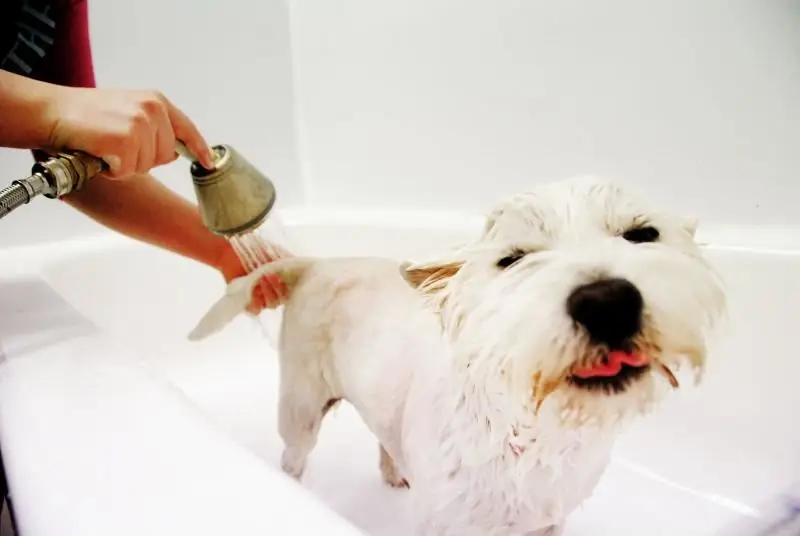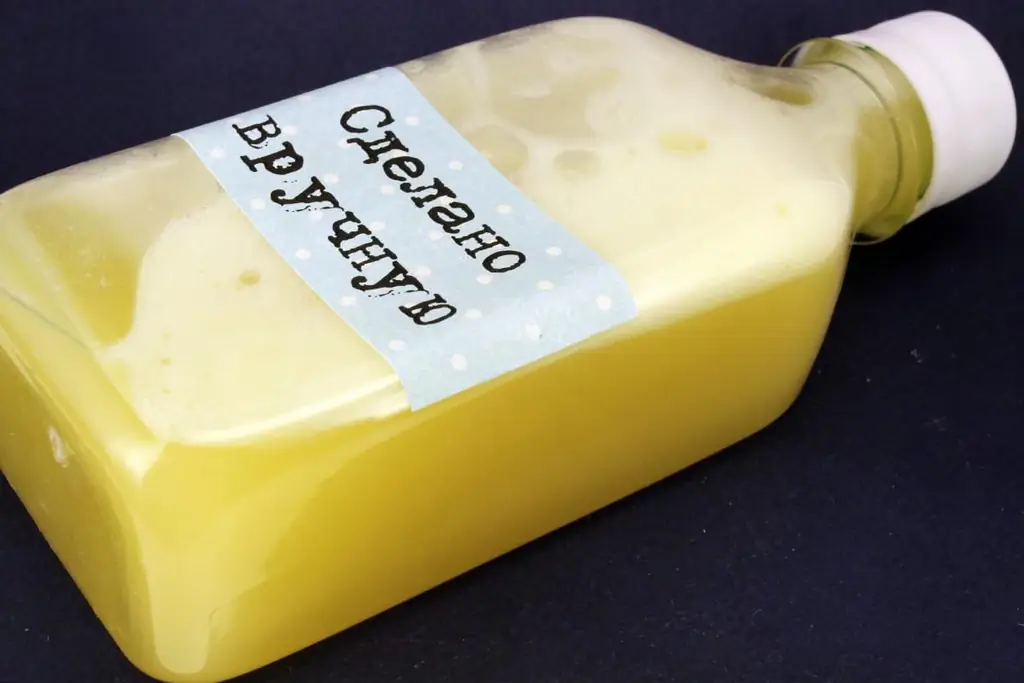
Table of contents:
- Author Bailey Albertson [email protected].
- Public 2023-12-17 12:53.
- Last modified 2025-06-01 07:32.
Japanese powders, or Safe, inexpensive and high-quality laundry

Japanese household products are becoming more and more popular. The quality and effectiveness of washing powders in liquid and dry form are noted by those who have already tested these products. But not everyone understands what are the features of Japanese products and whether they are really as safe as the manufacturers claim.
Content
-
1 Features of Japanese powders
- 1.1 Safe composition
-
1.2 Cost effectiveness
1.2.1 Table: Comparison of consumption of Japanese CJ Lion Top washing gel and Tide powder
- 1.3 Safety for the environment
-
2 Review of funds
2.1 Table: Comparative characteristics of popular Japanese powders
- 3 Rules for the use of Japanese powders
- 4 Reviews
Features of Japanese powders
Japanese detergents for washing clothes are valued for their safe composition, environmental friendliness and economy. These are the main benefits of most liquid and dry powders made in Japan.
Safe composition
The cleaning base of Japanese-made laundry detergents is vegetable raw materials - enzymes of protease, lipase, etc. In the composition of liquid and dry powders there are no toxic substances that increase the effectiveness of washing, but negatively affect a person:
- zeolites - widely used in various industries, medicine, salty, porous compounds containing silicon and aluminum, they are safe for the environment (do not lead to pollution of natural waters), but do not completely wash out from tissues, often cause allergic reactions, especially in children, accelerate wear of parts of washing machines (due to the fact that they are abrasive);
- phosphates - inorganic salts of phosphoric acids, which are included in powders to soften water and enhance the quality of washing, they pollute water bodies, cause allergies and impair metabolic processes with frequent contact of human skin with them;
- phosphonates are also salts of phosphoric acids, but organic, therefore, they have the same danger as phosphates with the only difference - their concentration in powders is lower, because less phosphorus gets into the water, which means less harm to the environment will be done.
The listed components of detergents irritate the skin, especially in people prone to allergies. With constant contact with things washed using powders with such substances in the composition, a person's immunity gradually decreases, the normal functioning of the kidneys and other internal organs is disrupted, as well as metabolic processes.

In children, people with weakened immunity, the elderly, phosphate powders often cause allergic reactions on the skin
Economy of funds
All powders made in Japan are concentrated. Despite their high cost, in the end we get good savings, since the expense is small.

For the convenience of dosing powders, many of them have a measuring spoon in the packaging.
Table: Comparison of consumption of Japanese CJ Lion Top washing gel and Tide powder
| Name of funds | The amount of laundry (when washing in a machine) - the rate of consumption of the product (with medium dirt) | Handwash |
| Washing gel CJ Lion Top |
|
1 teaspoon in 10 liters of water. |
| Tide powder | 4-5 kg - 150 g. | 50 g per 10 liters of water. |
Safe for the environment
The special composition of Japanese powders makes them environmentally friendly. Its components are biodegradable, therefore, after washing, they decompose into substances that are harmless to the environment. In addition, they are safe for the environment for the following important reasons:
- due to the absence of phosphates and phosphonates, they do not pollute natural water bodies - they do not cause water bloom, do not reduce the amount of oxygen dissolved in it, thereby not exerting a negative impact on the aquatic environment and its inhabitants;
- due to the absence of zeolites in the powders, the air is not saturated with dust (this feature is more noticeable in closed rooms, where air exchange is much weaker than in open spaces).

The presence of phosphate powders negatively affects the environment, for example, leads to water bloom
Funds overview
There are Japanese powders from different manufacturers on sale. The most popular are the following:
-
Shabondama Snoul. This is a powder soap, completely natural, without toxic additives. The product washes laundry efficiently, even in cold water. After its application, there is no residual smell of the product on the laundry.

Shabondama Snoul Powder Soap Shabondama Snoul has a concentrated composition, therefore it is consumed economically
-
Nissan Fa-fa. Children's powder with a floral aroma and natural composition. Washes stubborn stains of protein origin, washes out completely, does not cause allergies on the skin of the child.

Nissan Fa-fa Nissan Fa-fa is used to wash white and colored baby clothes
-
NAN Kaori Bio. The product contains natural cleaning ingredients. And also a water softener and fabric softener are added to it, so there is no need to additionally use these products during the washing process.

NAN Kaori Bio NAN Kaori Bio - concentrated Japanese powder based on herbal ingredients and soap
-
Emaar Kao. Gel for washing colored laundry, has a conditioning effect. It is perfectly washed off, does not wash out paint from fabrics, and has a low consumption.

Emaar Kao Emaar Kao - Conditioning Liquid Concentrated Powder
-
Acron Lion. The liquid detergent is intended for washing woolen and delicate fabrics. Also effective in cold water. Has a convenient dispenser.

Acron Lion The Acron Lion delicate wash gel packaging has a dispenser
-
Attack Bio. The powder is intended for washing children's and adult clothes. In addition to high-quality stain removal, including stubborn dirt, the product removes unpleasant odors and conditions the laundry.

Attack Bio One pack of Attack Bio 0.9 kg is designed for 23 washes in the machine
-
CJ Lion Top. The powder is multifunctional, as it contains water softeners, which increase the life of the machine, as well as bleach, so there is no need to use it separately. The product washes out well, does not irritate the skin.

Cj lion top CJ Lion Top washes and bleaches fabrics
-
Rocket Soap. Japanese baby powder washes well, whitens and softens clothes. Can be used to care for baby and adult linen. It is hypoallergenic.

Rocket soap Rocket Soap can be used to wash clothes for adults and children
-
Miyoshi. The powder does not irritate the skin, it is perfectly washed out. After washing, the laundry does not have a strong aroma, it is soft and clean. The product has a natural composition - pure soap and alkaline components.

Miyoshi Miyoshi is a powder soap for laundry that is suitable even for allergy sufferers
Table: Comparative characteristics of popular Japanese powders
| Product name and release form | Structure | Profitability | approximate price |
| Shabondama Snoul Powder Soap. | Pure soap (99% sodium aliphatic) | Consumption rate: 35 g for 4-5 kg of linen. | Packing 1 kg - 450 rubles. |
| Powder for washing baby clothes Nissan Fa-fa. |
|
20 g by 4.5 kg. | 900 g - from 450 rubles, 4 kg - from 1400 rubles. |
| Powder for washing colored clothes NAN Kaori Bio. |
|
30 g per 4.5 kg. | 700 g from 200 rubles. |
| Liquid detergent for washing colored laundry Emaar Kao. |
|
40 ml for 4.5 kg of laundry. | 500 ml - 455 rubles. |
| Liquid detergent for delicate and woolen clothes Acron Lion. |
|
30 ml for 4.5 kg of laundry | 500 ml - 320 rubles. |
| Attack Bio Powder. |
|
40 g by 4.5 kg. | 1 kg - from 550 rubles. |
| Washing gel CJ Lion Top |
|
40 ml for 4 kg. | 900 ml - 400 rubles. |
| Powder for washing baby clothes Rocket Soap. |
|
30 g for 4-5 kg. | 1 kg - 740 rubles. |
| Powder for washing baby and adult clothes Miyoshi. | Pure soap (potassium salt with 60% fatty acids) and alkaline components. | 35 g by 4.5 kg. | 2.16 kg - from 1100 rubles. |
Rules for the use of Japanese powders
A feature of Japanese laundry detergents is their concentrated composition. Therefore, the only difference in the way they are used, in comparison with the products of other manufacturers, is the need to use less quantity per wash. Consumption rates are always indicated on the packaging, usually in the form of a table.

Even if all the labels on the packaging are in Japanese, it's easy to understand how to use the powder: a convenient table clearly shows this
The recommended water temperature for washing is 30-40 degrees.
Reviews
The natural composition and the absence of phosphates are the main differences between Japanese powders. Since most of them are concentrated, along with safety for human health and the environment, they are also characterized by economy. It is a profitable and sensible alternative to the usual powders, especially necessary for the care of the linen of young children and people prone to allergies.
Recommended:
How To Boil Laundry At Home: In A Saucepan, With Powder, Vegetable Oil And Other Methods

Why boil laundry: when is it necessary and what can be replaced. What things can be handled this way. Step-by-step instructions for the process
Flea Spray For Cats ("Fipronil" And Others): Instructions For Using The Product, Effectiveness, Reviews Of Veterinarians And Pet Owners

Types of flea sprays. An overview of popular manufacturers of animal and indoor sprays. DIY step-by-step instructions for making a repellent
Flea Shampoo For Dogs: When And How To Use The Product, A Review Of Popular Brands, Reviews On Their Effectiveness

The principle of action of flea shampoos for dogs, their effectiveness and parameters that you should pay attention to when buying. Review of popular brands. Reviews
How To Make A Do-it-yourself Dishwashing Detergent Using Soda, Hydrogen Peroxide, Laundry Soap, Mustard Powder

How to replace purchased dishwashing detergents, the pros and cons of household and chemical products. Crafting recipes using simple ingredients
How To Choose A Good Electric Toothbrush For An Adult And A Child And Which Manufacturers Are Better + Videos And Reviews

How to choose an electric toothbrush? Rating of brushes from different manufacturers for adults and children, expert advice and customer reviews
